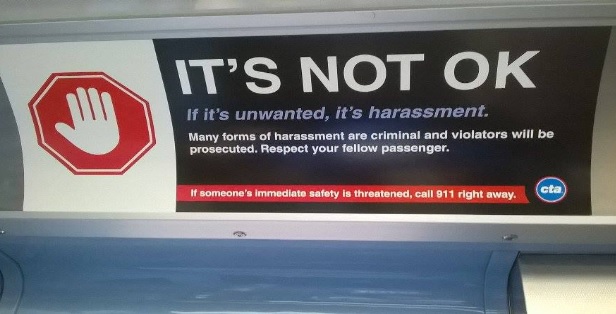Hope Herten, IL, USA, SSH Blog Correspondent
Frequently, like the rest of society, I have to leave my bedroom, stop browsing through social media and watching old episodes of Sex in the City, and go outside, whether or not I am going to class, work, or anywhere else. Going places is a general requirement for being a person and when you live in a city without a car, any mode of transportation you choose is a part of the public sphere. Whether I am riding my bike, taking a cab or ride share, or on public transportation (the “L”), I enter an environment where I am surrounded by other people and in doing so, I unwillingly become the target of stares and comments by strangers.
Normally, it is a relatively uneventful experience, aside from near-death experiences on my bike, erratic cab drivers, and less than pleasant smells on the train or bus. All in all, the majority of my commute is devoid of unwanted encounters. Despite not being the majority of my experience, harassment as I am “making my way downtown” occurs frequently enough for it to stick in the back of my mind no matter where I go. As one of my friends said, “I’m a human that needs to get places and I won’t let a male stop me. (Assuming the street harasser is a male). That doesn’t mean I’m not cautious. I’m especially cautious at night or when I see a group of males around, even if it’s in the middle of the day”.
I am not one to let fear keep me from doing what I want, I am not about to let an experience or stories from friends keep me from venturing to different parts of the city, but that doesn’t mean I am not aware.
I have had more than my share of harassment experiences while on my way to work, which for me is one of the most troubling types of harassment. Not that I welcome harassment on my days off, but there is something about being yelled at or cornered on my way to work that makes the rest of the day horrible. On my bike men have yelled at me from the street and, to my horror, from their cars, pulling up beside me to say something. Less so cab drivers, but there are a handful of times that while I am using ride shares like Uber and Lyft that my driver has repeatedly hit on me and refused to give up when I denied to give them my number.
By far though, my experiences of harassment on the “L” are the most frequent and frustrating. On the train, I have been approached by men who are alone and by groups of men, telling me what they think of how I look or asking for my number. These situations are often frightening and never feel good. On one occasion when I was traveling to work a group of men, the only other people in the train car, were yelling at me, as I continued to ignore them they approached me, threatening me by asking, “Who do you think you are to ignore me?” Luckily, my stop came and they did not follow me, but it was difficult to go through an eight hour workday doing customer service after I was so shaken. It was actually this experience in particular that motivated me to seek out organizations like Stop Street Harassment and Hollaback! to see what people were doing to stop street harassment.
When asking my friends about their experiences on the “L”, they shared similar experiences: men coming up to them, sitting next to them, relentlessly pursuing them until they are forced to leave the car. My group of friends and I must not have been the only women who have experienced serious harassment while on public transportation, because recently the Chicago Transit Authority (CTA) began an ad campaign to bring awareness to the issue.

Ads on the trains and buses encourage passengers to not just sit by and watch fellow riders be harassed or threatened during their commute. A CTA official told the Chicago Tribune in an interview that they are aware that the vast majority of harassment cases are not reported, “One of the main reasons for this campaign is that we want customers to report incidents they experience or witness.”
As the campaign is relatively new, many of the people with whom I spoke had not noticed the advertisements, but upon viewing images of them, they agreed that they would be helpful. Many people agreed that bringing any sort of attention to the issue is good and could encourage bystanders to intervene and victims to report cases, but a few people whom I interviewed expressed concern that since they hadn’t noticed the ads, the efforts should be expanded and that the ads should be more eye catching. I carry the same sentiment as many of my peers, but this is definitely a step in the right direction.
Maybe one day I won’t have to practice my resting bitch face in the mirror before heading to work.
Hope is a full-time undergraduate student studying public health and Spanish in Chicago, IL. During her time in Chicago, Hope has participated in many protests and events trying to call awareness to women’s issues on campus and in the broader Chicago community. Follow her on Twitter @hope_lucille or check out her public health blog.

